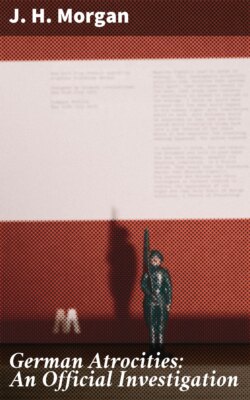Читать книгу German Atrocities: An Official Investigation - J. H. Morgan - Страница 7
На сайте Литреса книга снята с продажи.
German Invocation of The Hague Conventions.
ОглавлениеThe case which the German Government had avowedly to meet was the wholesale slaughter of Belgian civilians, and the fact of such slaughter having taken place they make no attempt to deny. They enter a plea of justification and, in a word, they attempt to argue that the levée en masse or “People’s War” of the Belgian nation was not conducted in accordance with the terms of the Hague regulations relating to improvised resistance in cases of this kind. I will not here go over the well-trodden ground of Belgian neutrality; it is enough that in a now notorious utterance the Imperial Chancellor has admitted that the German invasion was a breach of international law.4
The substance of the Hague Convention5 is that the civil population of a country at war are entitled to recognition as lawful belligerents if they conform to four conditions. They must have a responsible commander; they must wear a distinctive and recognisable badge; they must carry their arms openly; and they must conduct their operations in accordance with the laws and customs of war. In the case, however, of an invasion, where there has been no time to organise in conformity with this article, the first and second conditions are expressly dispensed with, provided there is compliance with the third and fourth. Now, not only have these rules been subscribed by the German representatives and, according to Baron Marschall von Bieberstein, their principal spokesman at the Hague Conference, such subscription was absolute and unconditional;6 but the principle which they embody has been accepted by all the leading German jurists. “There exists no ground for denying to the masses of a country the natural right to defend their Fatherland ...; it is only by such levies that the smaller and less powerful States can defend themselves.”7 The same authority argues that no State is bound to limit itself to its regular army; it could, he adds, call up civil guards or even women and children, who in such case would be entitled to the rights of lawful belligerents.8
What then is the German justification for the massacre of the Belgian civilians? Its main contention is that the Belgian Government “had sufficient time for an organisation of the People’s War as required by international law”;9 in other words that a spontaneous and unorganised resistance in Belgium could not claim the immunities of Article 2 of the Hague Regulations. The effrontery of this contention is truly amazing. The Belgian Government had, at the most, two days—two days in which to organise a whole nation for defence. The German ultimatum to Belgium was issued on August 2nd; the violation of Belgian territory took place on August 4th. How could a little nation with a small standing army organise its whole population on a military basis within two days against the most powerful and mobile army in Europe, equipped with all the modern engines of war? The German Government do, indeed, attempt to support their contention by urging further that “the preparation of mobilisation began, as can be proved, at least a week before the invasion of the German Army.”10 Now, granting—and it is granting a great deal—that a week would be sufficient to organise untrained civilians for defence, it would still remain to be proved that the Belgian Government did begin to mobilise a week beforehand. The German White Book does not prove it; the Belgian Grey Book disproves it. The Belgian Government, relying on the plighted faith of Germany, had not even begun to mobilise on July 29th—six days before the invasion.11 Indeed, it was only on July 24th that they were sufficiently alarmed to address interrogatories to the Great Powers, Germany among them, for assurances as to the immunity of Belgium from attack.12 As late as July 31st the German Government effectually concealed its intentions.13 It is, in fact, a matter of common notoriety that the German move against Belgium was as sudden in execution as it was premeditated in design. She entered like a thief in the night.
